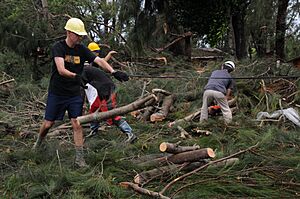Typhoon Kompasu (2010) facts for kids
Typhoon Kompasu was a strong storm that formed in August 2010. People on the island of Okinawa, especially at the United States Air Force base, started getting ready for it on August 28. They used a special warning system called Tropical Cyclone Condition of Readiness (TCCOR). Level three was announced on August 29. By August 30, weather experts knew the storm would get stronger. They expected winds faster than 130 kilometers per hour (81 mph).
Because of the strong winds expected, the TCCOR level was raised to two. On August 31, for the first time in over three years, TCCOR level one was announced. This meant everyone on the island, including military staff, needed to finish their preparations. They were told to stay inside until the typhoon passed. When Kompasu hit Okinawa on August 31, the highest warning, TCCOR One-E (emergency), was declared. After the storm moved away, the emergency warning changed to a recovery alert as conditions improved.
Impact of Typhoon Kompasu
Typhoon Kompasu brought strong winds and heavy rain to Okinawa. About 32,000 homes lost electricity. The town of Motobu had the most rain, with about 126 millimeters (4.96 inches) falling.
Damage and Injuries
Winds stronger than 150 kilometers per hour (93 mph) were recorded. These powerful winds even knocked down a 300-year-old tree. This 17-meter (56 ft) tall Sion Pine Tree was the last of its kind on the island. It used to be a symbol of northern Okinawa.
The Okuma Recreation Facility was badly damaged. It had to close for at least a week. According to a United States Air Force captain, concrete towers also fell during the storm. Even though Kompasu was a very strong typhoon, no one died in Okinawa. However, five people were hurt. Some houses had their roofs damaged, and a few families had to leave their homes.
Travel Disruptions
The typhoon also caused many travel problems. A total of 432 flights to and from Okinawa were canceled. This left 57,126 people stranded, meaning they could not travel as planned.
Images for kids
 | Toni Morrison |
 | Barack Obama |
 | Martin Luther King Jr. |
 | Ralph Bunche |




